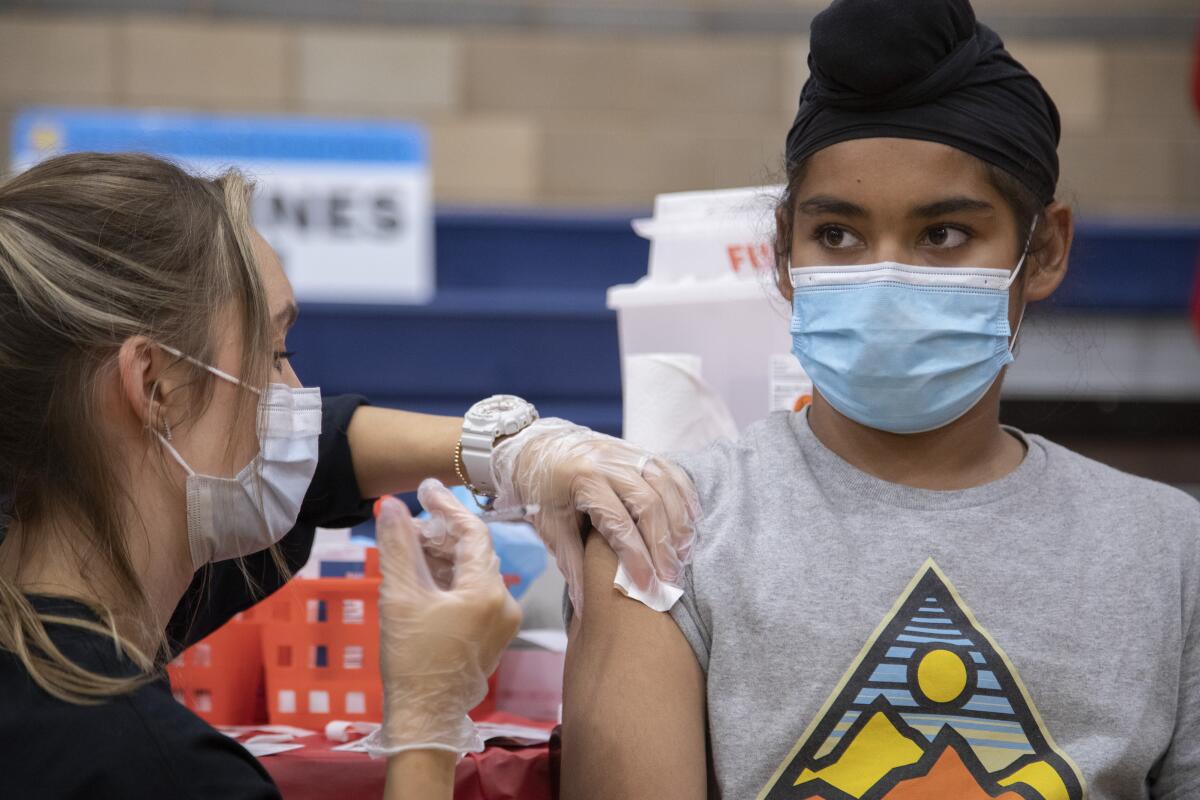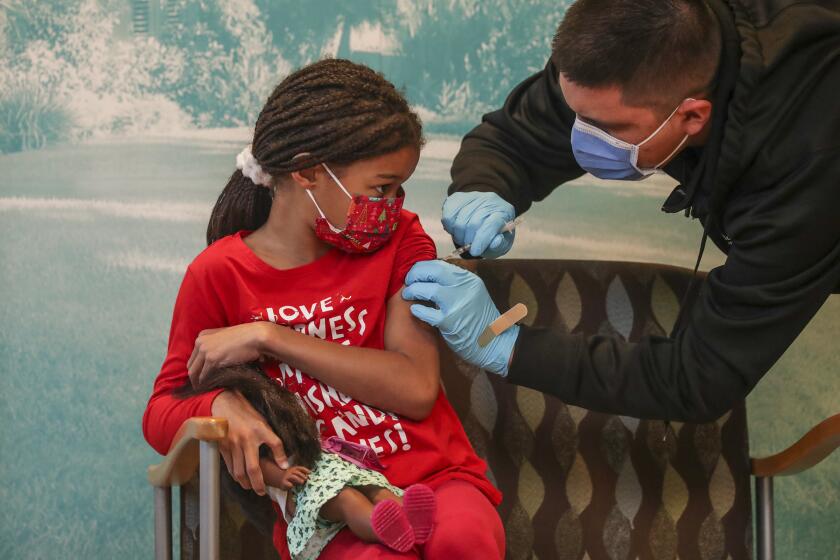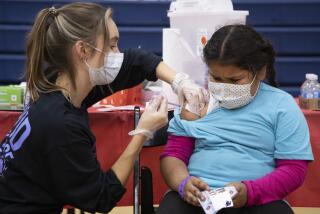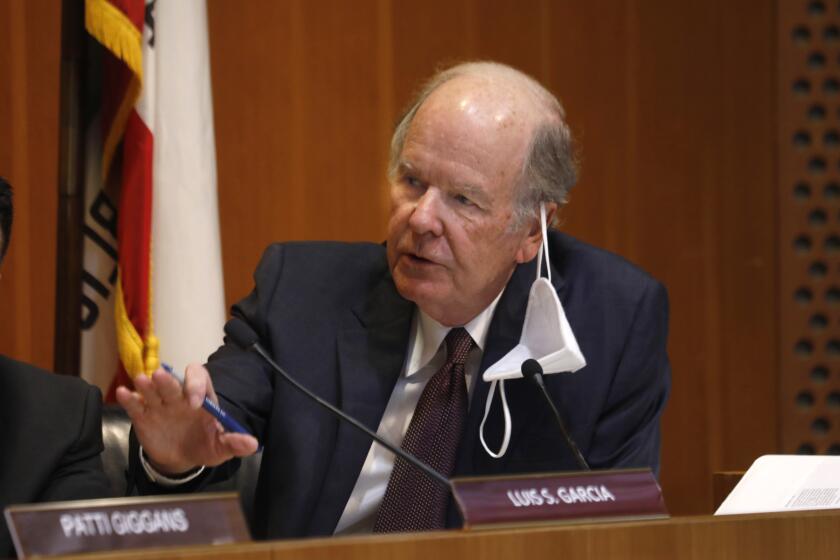California plan to require student vaccination sparks intense debate. Here’s what we know

- Share via
California once again finds itself at the center of the national debate about COVID-19 safety, with new proposals that would, among other things, require that California students be immunized.
The plans are generating intense debate about the best ways to keep schools open, parent rights and the role of the government.
State Sen. Richard Pan (D-Sacramento) announces a bill to add COVID-19 vaccines to California’s list of required inoculations for attending K-12 schools.
Here is a breakdown of what we know:
What are the new proposals?
- Senate Bill 871, by state Sen. Richard Pan (D-Sacramento), would add COVID-19 vaccinations to California’s list of required inoculations for attending K-12 schools, which can be skipped only if a student receives a rare medical exemption. If passed by the Legislature and signed by the governor, the measure would supplant a more limited COVID-19 vaccination mandate for schools that was initiated by Gov. Gavin Newsom last year. Under the bill, the California Department of Public Health could mandate vaccinations in the future without requiring the state to offer personal belief exemptions, a move that would make it easier to add COVID-19 boosters or other immunizations for students without a lengthy legislative process.
- Senate Bill 866, introduced by Sen. Scott Wiener (D-San Francisco), would permit children 12 and older to choose to be vaccinated, including against COVID-19, without a parent’s consent or knowledge.
How would this change the landscape?
California already has plans to require students at all public and private schools to receive the COVID-19 vaccination. However, that mandate, which was announced by Newsom in October, does not take effect until after the U.S. Food and Drug Administration fully approves the shot for children ages 12 and older. Currently, the Pfizer-BioNTech vaccine is fully approved for ages 16 and older, and there is only an emergency authorization in place for ages 5 to 15, which is a lesser standard than full approval.
Newsom’s mandate is limited to grades seven through 12 and has a key caveat: Once the vaccine is fully approved, parents could still cite personal beliefs to opt their children out of being inoculated. Under existing law, the state must offer personal belief exemptions for any newly required vaccine unless it is added through new legislation to the list of shots students must receive to attend school in California. For those vaccinations already mandated through legislation, state law requires a medical exemption to skip some or all of them for in-person attendance at K-12 schools.
Pan’s bill would go much further than Newsom’s mandate, starting with requiring all public and private school students 5 years and older to be vaccinated against COVID-19 beginning Jan. 1, 2023. That requirement would be in place even if the Pfizer-BioNTech vaccine remains available only through an emergency authorization for ages 5 to 15, although Pan said that language is “something we’re still working out.”
Pan’s proposed law also would apply to childcare centers, nursery schools and home-based daycare. However, there is not currently a vaccine approved for children under 5 years old. Once that happens, the bill as currently written would apply to those age groups, too.
What do supporters say?
Pan said his proposal is needed to insure that students and staff are safe on campus and that schools remain open.
“We need to make sure schools are safe so that all parents are comfortable sending their children to school,” said Pan, a pediatrician whose previous legislation has strengthened oversight of vaccine exemptions. “And we want to keep schools open.”
He also argued vaccinations already enjoy strong majority support from parents. Some parents are keeping students out of school fearing virus transmission, he added.
What do critics say?
“California parents don’t want the state making parenting decisions for them.” said Stefanie Fetzer, founder of Parents United 4 Kids, which advocates for parental choice.
Both bills are expected to be met with strong opposition from groups that don’t believe the broad scientific consensus behind the benefits of COVID-19 vaccines and those who argue that parents should decide whether to inoculate their children without government intervention.
“It’s pretty clear they don’t want to give your children a choice. If they decide not to have a vaccine under this bill, they will be kicked out of school. This is about them wanting you to make the choice that the government has decided for you,” said Assemblyman James Gallagher (R-Yuba City).
Families that don’t comply would have to enroll their children in an independent study or other remote learning program. They also would have the option to home-school their children.
Where do we stand with vaccination rates for kids?
Vaccination rates remain low among younger children in the state, with less than a quarter of 5- to 11-year-olds fully vaccinated, according to data from the California Department of Public Health. Nearly 64% of children 12 to 17 are fully vaccinated in California, while overall 73% of residents in the state eligible for a COVID-19 shot have received both doses.
What’s next?
Both vaccine-related bills now need to go through the legislative process, where passionate debate is expected.
Legislative attempts to change vaccine laws in schools have previously led to intense deliberations, prolonged protests and arrests.
Newsom suggested in October that he may be open to legislative action to strengthen his more-limited COVID-19-vaccine mandate, but on Monday his office declined to comment on SB 871.
Follow reporter Melody Gutierrez on Twitter for more on the legislation in the coming days.
More to Read
Sign up for Essential California
The most important California stories and recommendations in your inbox every morning.
You may occasionally receive promotional content from the Los Angeles Times.















